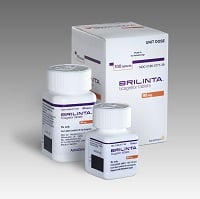 |
| AstraZeneca's headquarters in London--Courtesy of AstraZeneca |
It's not often that a Big Pharma company puts out a press release announcing the launch of a preclinical drug program. The mortality rate of therapies that have yet to start human testing is daunting, which is not too surprising considering the number of things that can go wrong--particularly when an experimental drug is intended for a big market. Yet AstraZeneca ($AZN), which has been trumpeting a major turnaround in its pipeline, has done just that--even going so far as to hype its new drug's potential impact on the market by bolstering a struggling product.
Thrust into the spotlight this morning is MEDI2452, a neutralizing antibody designed to reverse the antiplatelet effects of Brilinta. If it works, AstraZeneca has a shot at making Brilinta safer to work with, eliminating or reducing the threat of major bleeding for patients who take the anti-clotting drug.
Commercial success with Brilinta is key for AstraZeneca. Fighting off Pfizer's ($PFE) unwelcome buyout effort, CEO Pascal Soriot claimed that Brilinta was on track to become a $3.5 billion earner. But with rival blood thinners on the market and generic Plavix available as a cheap and popular alternative, the company has faced a steep uphill climb in the healthcare market.
 Just a few days from now AstraZeneca will hold its annual pipeline review, and there's been considerable speculation that Pfizer may renew its much criticized merger attempt. So AstraZeneca wants to be ready to help make its case again for Brilinta. And that's where the preclinical MEDI2452 comes into play.
Just a few days from now AstraZeneca will hold its annual pipeline review, and there's been considerable speculation that Pfizer may renew its much criticized merger attempt. So AstraZeneca wants to be ready to help make its case again for Brilinta. And that's where the preclinical MEDI2452 comes into play.
"In certain emergencies, doctors need to have the option to swiftly reverse the effects of oral antiplatelet agents, in order to enable emergency surgery or a quick response to a major bleeding event without having to wait for the effects of the medicine to wear off. Currently there are no FDA approved medications to counteract the antiplatelet effect in these situations," said Marc Ditmarsch, who's running the development program for Brilinta. "If the circumstances demand it, we believe MEDI2452 has the potential to help address this need for patients treated with Brilinta."
There's still plenty of work to be done in the clinic on Brilinta. As AstraZeneca points out, it has 5 studies underway involving 80,000 patients. PEGASUS-TIMI 54, with 21,000 subjects, is due to wrap up in the next few months.
Brilinta wasn't supposed to be in this position. Back when it was approved three years ago some bullish analysts had estimated that sales would be headed to the $2.7 billion mark about now. There has been progress, though, with new treatment guidelines marking Brilinta as the preferred therapy for certain acute coronary conditions. Earlier this year the Justice Department also backed off a threatened probe of the clinical trial used to obtain an approval, allowing the company to resume an ambitious marketing campaign in the U.S.
- here's the release